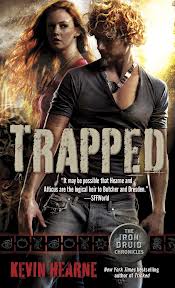Trapped is the
fifth book of Hearne’s Iron Druid series.
Twelve years have passed since the events of Tricked. Atticus is close to
completing the training and initiation of Granuaile when their plans are
interrupted by debts and vendettas. I
won’t go into specifics in order to avoid spoilers, but they travel to various
gods’ realms and have to overcome a wide variety of enemies.
If you’ve been keeping up with the series, you’ll find all
your favorite elements here: a fast
moving plot, with plenty of action; hilarious banter with Atticus and Oberon;
inventive characterizations of various deities and mythological figures. As Atticus faces various challenges and
enemies, we realize that each situation is a result of his earlier
actions. This was perhaps the most
impressive part to me: Hearne’s tight
plotting extended across multiple books, paying off here.
A more recent development, and most welcome, is the
emergence of Granuaile as a more well-rounded character. In Trapped,
she seems to come into her own, and is portrayed with quite a bit of
agency. This works against the common
trope of the assistant or love interest who is essentially one dimensional,
there to enable exposition or admiration of the protagonist’s strengths.
If you are new to the Iron Druid series, I would not
recommend starting here. So many plot
elements depend on action from the previous books that you would be best served
by starting at the beginning. For readers
familiar with the series, Trapped
shows that the Iron Druid series continues to improve. I’m excited to find out what adventures
Atticus, Granuaile, and Oberon have next.





